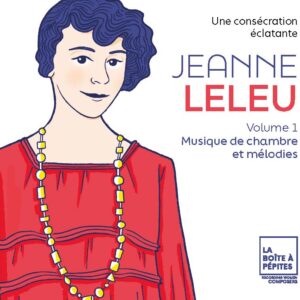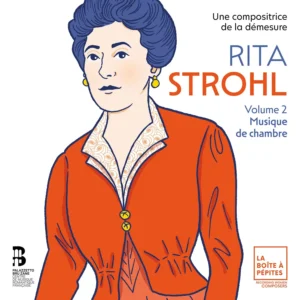"She gave language to the most sublime abstractions, clad water and fire in orchestral flesh, and suggested through sound the motions of atoms and sap."
Carlos Larronde, "Rita Strohl, a cosmic musician" (Le Soir, March 6, 1931)
With Les Cygnes [The Swans] and the Symphonie de la Forêt [Forest Symphony], Rita Strohl sought a form of communion with nature, a decisive turning point towards a musical style that became increasingly symbolist and spiritual, which subsequently led her to compose grand lyrical and mystical works such as Yajnavalkya.
CD1
La Symphonie de la Forêt - (1901 ou 1903) 44'54
for orchestra - Orchestre National d'Île-de-France, dir. Case Scaglione
I. L'Étang 15’30
II. L'Âme en peine 6’49
III. Marche funèbre d'un scarabée 3’40
IV. Chasse à l'aurore - Aurore et lever de soleil 18’54
Les Cygnes - poésie de Georges Rodenbach - (1899) 7’47
for orchestra and voice - Marie Perbost, Orchestre National d'Île-de-France, dir. Case Scaglione
"Les cygnes blancs, dans les canaux des villes mortes"
La Flûte de Pan - poème de Pierre Louÿs - (1900) 3’21
for orchestra and voice - Marie Perbost, Orchestre National d'Île-de-France, dir. Case Scaglione
"Pour le jour des Hyacinthies, il m'a donné un syrinx"
La Momie - (1905) 4’42
for orchestra and voice - Lucile Richardot, Orchestre National d'Île-de-France, dir. Case Scaglione
"Belle petite morte au squelette exigu"
la Cloche fêlée - poésie de Charles Baudelaire - (1905) 3’23
for orchestra and voice - Lucile Richardot, Orchestre National d'Île-de-France, dir. Case Scaglione
"Il est amer et doux, pendant les nuits d'hiver"
Yajnavalkya - Mystère sacré en trois actes- (1907) 10’32
for orchestra - Orchestre National d'Île-de-France, dir. Case Scaglione
Prélude de l'Acte II




